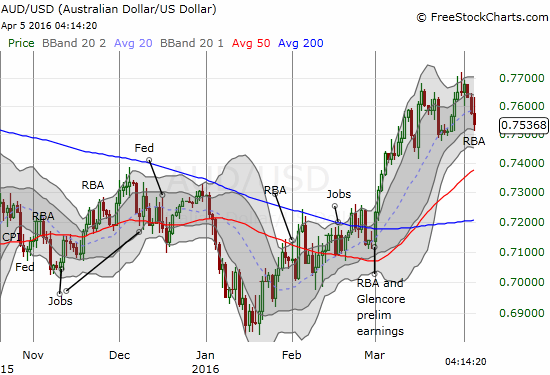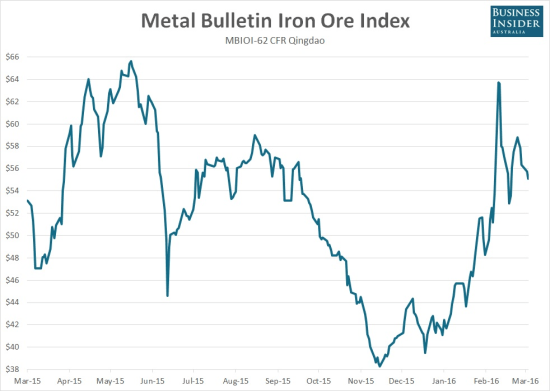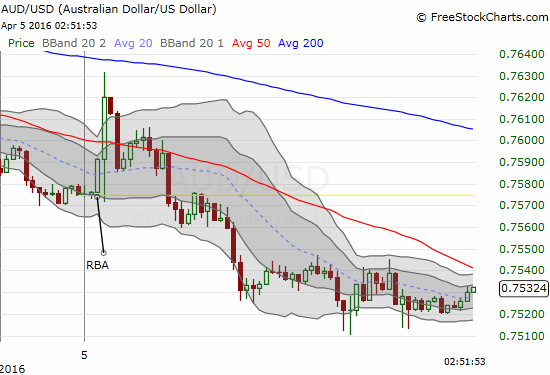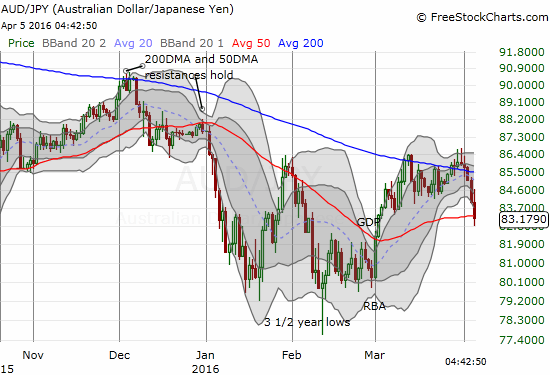“The Australian dollar has appreciated somewhat recently. In part, this reflects some increase in commodity prices, but monetary developments elsewhere in the world have also played a role. Under present circumstances, an appreciating exchange rate could complicate the adjustment under way in the economy.” – Statement by Glenn Stevens, Governor: Monetary Policy Decision, April 5, 2016 (emphasis mine)
The Reserve Bank of Australia (RBA) has not referred to undesirable strength in the Australian dollar (Guggenheim CurrencyShares Australian Dollar (NYSE:FXA)) in a very long time. The currency has had a very strong run against the U.S. dollar from the January lows although in the past month AUD/USD has swung wildly. Note how the rally accelerated after the LAST RBA meeting!
AUD/USD accelerated its rally in the first part of March, but trading has become a lot more rocky and volatile since then.
The Australian dollar has held up even as Iron ore prices have tumbled off a recent and dramatic run-up.
As of March 30th, iron ore’s uptrend from the November lows remains intact, but prices are well off the recent parabolic run-up from March.
The intraday reaction to the RBA’s latest statement on monetary policy was very strange. The currency was very volatile. The currency market could not decide what to think: an initial burst upward followed by a persistent sell-off.
In response to the RBA’s latest statement on monetary policy, AUD/USD lunged higher before selling off for the rest of the overnight and Asian/European trading sessions
The intraday reaction to the RBA was surprising. Despite the RBA’s explicit reference to the problematic Australian dollar, the currency surged for the first 30 minutes or so. It took another 3 hours for that trigger reaction to reverse. As of the time of writing, the weakness is on-going. Perhaps most importantly, AUD/JPY has definitely failed its test with its 200-day moving average (DMA). Even the 50DMA is failing as support. I hear bears roaring in the distance…
The Australian dollar is breaking down against the Japanese yen
The rest of the RBA’s statement was pretty much boilerplate: China’s growth rate is still moderating, Australia’s terms of trade are much lower, global financial conditions remain accomodative, inflation is low, the economy is relatively sound overall, and the RBA thinks rates should stay where they are. The RBA still claims it remains ready to drop rates if needed. The housing market is one point of notable change:
“Credit growth to households continues at a moderate pace, albeit with a changed composition between investors and owner-occupiers. The pace of growth in dwelling prices has moderated in Melbourne and Sydney and has remained mostly subdued in other cities.”
Overall, I am keeping a neutral stance on the Australian dollar. I remain short AUD/JPY, but I like to go long the Australian dollar against weaker currencies for short-term trades. This approach will naturally change if the Australian dollar suddenly becomes one of those weaker currencies.
Be careful out there!
Full disclosure: long and short various currencies against the Australian dollar
- English (USA)
- English (UK)
- English (India)
- English (Canada)
- English (South Africa)
- English (Philippines)
- English (Nigeria)
- Deutsch
- Español (España)
- Español (México)
- Français
- Italiano
- Nederlands
- Português (Portugal)
- Polski
- Português (Brasil)
- Русский
- Türkçe
- العربية
- Ελληνικά
- Svenska
- Suomi
- עברית
- 日本語
- 한국어
- 简体中文
- 繁體中文
- Bahasa Indonesia
- Bahasa Melayu
- ไทย
- Tiếng Việt
- हिंदी
RBA: Australian Dollar Has Become Too Strong
Published 06/04/2016, 02:54 pm
Updated 09/07/2023, 08:31 pm
RBA: Australian Dollar Has Become Too Strong
Latest comments
Loading next article…
Install Our App
Risk Disclosure: Trading in financial instruments and/or cryptocurrencies involves high risks including the risk of losing some, or all, of your investment amount, and may not be suitable for all investors. Prices of cryptocurrencies are extremely volatile and may be affected by external factors such as financial, regulatory or political events. Trading on margin increases the financial risks.
Before deciding to trade in financial instrument or cryptocurrencies you should be fully informed of the risks and costs associated with trading the financial markets, carefully consider your investment objectives, level of experience, and risk appetite, and seek professional advice where needed.
Fusion Media would like to remind you that the data contained in this website is not necessarily real-time nor accurate. The data and prices on the website are not necessarily provided by any market or exchange, but may be provided by market makers, and so prices may not be accurate and may differ from the actual price at any given market, meaning prices are indicative and not appropriate for trading purposes. Fusion Media and any provider of the data contained in this website will not accept liability for any loss or damage as a result of your trading, or your reliance on the information contained within this website.
It is prohibited to use, store, reproduce, display, modify, transmit or distribute the data contained in this website without the explicit prior written permission of Fusion Media and/or the data provider. All intellectual property rights are reserved by the providers and/or the exchange providing the data contained in this website.
Fusion Media may be compensated by the advertisers that appear on the website, based on your interaction with the advertisements or advertisers.
Before deciding to trade in financial instrument or cryptocurrencies you should be fully informed of the risks and costs associated with trading the financial markets, carefully consider your investment objectives, level of experience, and risk appetite, and seek professional advice where needed.
Fusion Media would like to remind you that the data contained in this website is not necessarily real-time nor accurate. The data and prices on the website are not necessarily provided by any market or exchange, but may be provided by market makers, and so prices may not be accurate and may differ from the actual price at any given market, meaning prices are indicative and not appropriate for trading purposes. Fusion Media and any provider of the data contained in this website will not accept liability for any loss or damage as a result of your trading, or your reliance on the information contained within this website.
It is prohibited to use, store, reproduce, display, modify, transmit or distribute the data contained in this website without the explicit prior written permission of Fusion Media and/or the data provider. All intellectual property rights are reserved by the providers and/or the exchange providing the data contained in this website.
Fusion Media may be compensated by the advertisers that appear on the website, based on your interaction with the advertisements or advertisers.
© 2007-2025 - Fusion Media Limited. All Rights Reserved.




